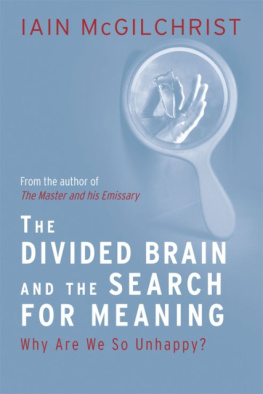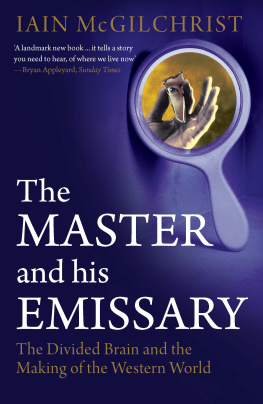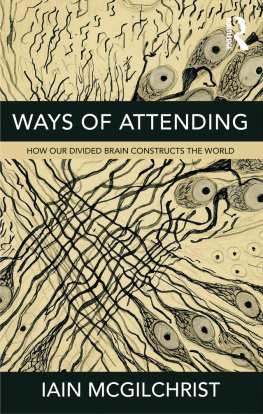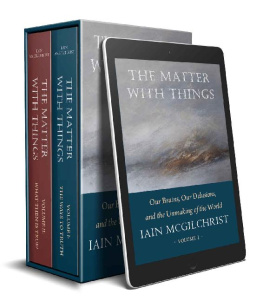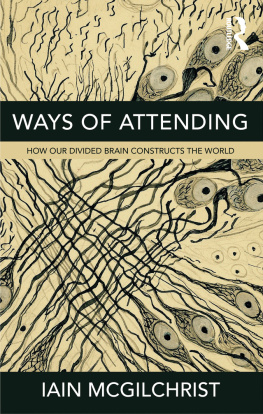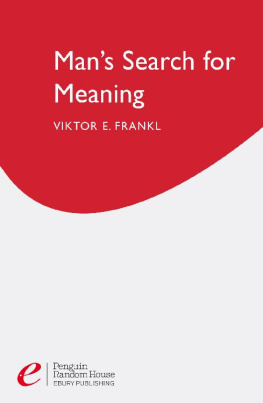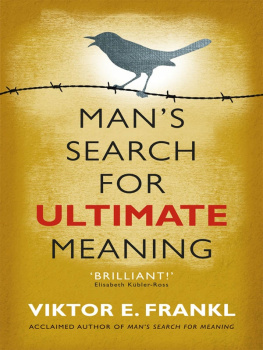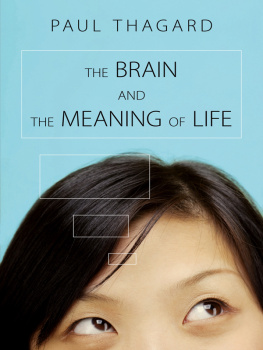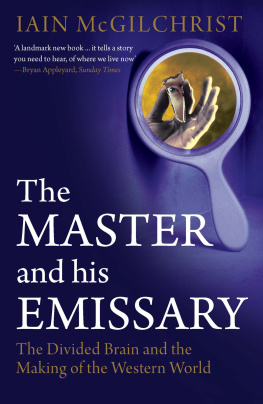McGilchrist - The Divided Brain and the Search for Meaning
Here you can read online McGilchrist - The Divided Brain and the Search for Meaning full text of the book (entire story) in english for free. Download pdf and epub, get meaning, cover and reviews about this ebook. year: 2012, publisher: Yale University Press, genre: Romance novel. Description of the work, (preface) as well as reviews are available. Best literature library LitArk.com created for fans of good reading and offers a wide selection of genres:
Romance novel
Science fiction
Adventure
Detective
Science
History
Home and family
Prose
Art
Politics
Computer
Non-fiction
Religion
Business
Children
Humor
Choose a favorite category and find really read worthwhile books. Enjoy immersion in the world of imagination, feel the emotions of the characters or learn something new for yourself, make an fascinating discovery.
- Book:The Divided Brain and the Search for Meaning
- Author:
- Publisher:Yale University Press
- Genre:
- Year:2012
- Rating:4 / 5
- Favourites:Add to favourites
- Your mark:
- 80
- 1
- 2
- 3
- 4
- 5
The Divided Brain and the Search for Meaning: summary, description and annotation
We offer to read an annotation, description, summary or preface (depends on what the author of the book "The Divided Brain and the Search for Meaning" wrote himself). If you haven't found the necessary information about the book — write in the comments, we will try to find it.
McGilchrist: author's other books
Who wrote The Divided Brain and the Search for Meaning? Find out the surname, the name of the author of the book and a list of all author's works by series.
The Divided Brain and the Search for Meaning — read online for free the complete book (whole text) full work
Below is the text of the book, divided by pages. System saving the place of the last page read, allows you to conveniently read the book "The Divided Brain and the Search for Meaning" online for free, without having to search again every time where you left off. Put a bookmark, and you can go to the page where you finished reading at any time.
Font size:
Interval:
Bookmark:

Iain McGilchrist is a former Consultant Psychiatrist and Clinical Director at the Bethlem Royal & Maudsley Hospital, London, and has researched in neuroimaging at Johns Hopkins University Hospital, Baltimore. He taught English at Oxford University, where he has been three times elected a Fellow of All Souls College. He works privately in London and otherwise lives on the Isle of Skye. He is the author of The Master and His Emissary: The Divided Brain and the Making of the Western World (2009).
Praise for The Master and His Emissary:
A seminal bookProfessor Ervin Lszl, Huffington Post
A landmark new bookit tells a story you need to hear, of where we live nowBryan Appleyard, Sunday Times
A fascinating book[McGilchrist] is a subtle and clever thinker, and unusually qualified to range with such authority over so many different domains of knowledge'Harry Eyres, Financial Times
McGilchrist's careful analysis of how brains work is a veritable tour de force, gradually and skilfully revealed. I know of no better exposition of the current state of functional brain neuroscienceProfessor W.F. Bynum, Times Literary Supplement
This is a very remarkable bookMcGilchrist, who is both an experienced psychiatrist and a shrewd philosopher, looks at the relation between our two brain-hemispheres in a new light, not just as an interesting neurological problem but as a crucial shaping factor in our cultureclear, penetrating, lively, thorough and fascinatingsplendidly thought-provokingProfessor Mary Midgley, Guardian
EDITOR'S NOTE
Iain McGilchrist's The Master and His Emissary: The Divided Brain and the Making of the Western World was published in 2009, to worldwide acclaim. Clearly The Master and His Emissarys combination of fascinating neurological research with a deep knowledge of Western culture and a profound insight into what it is to be human struck a chord, and, ever since, Iain has been deluged with follow-up questions and suggestions, and invitations to speak at events and conferences.
Inevitably, one of those questions has been, When are you going to write another book?, but, given that The Master and His Emissary draws on more than twenty years of research, a new full-length book would be a significant undertaking. Instead, to coincide with the new paperback edition of The Master and His Emissary, Yale invited Iain to write one of the first in a new series of short, lively e-books by some of our most popular authors, in which he draws on his research into the role of the right and left hemispheres to address the crucial question: just why are modern Westerners so unhappy? We hope you enjoy it.
Phoebe Clapham
Editor, Yale University Press
How is it that the more able man becomes to manipulate the world to his advantage, the less he can perceive any meaning in it? This is a paradox that has often been noted, and has sometimes been attributed to a fundamental perversity, a sort of pure cussedness, in human nature.
The world has changed since the philosopher Owen Barfield wrote those words thirty-five years ago. But the paradox, as he calls it, has got no nearer being resolved, while the evidence has continued to accumulate that his hunch was right. Our increasing ability to manipulate the world does indeed appear somehow connected with its loss of meaning for us. Why? And does it even matter?
An influential strand in contemporary thinking suggests that the quest for meaning is itself meaningless. Nowadays, it is said, we see things more clearly than was hitherto possible. The world has become comprehensible in ways that offer new possibilities for freedom and the exercise of human ingenuity. Instead of resorting to myths to explain what we cannot understand, we now know that it is only a matter of time before science will offer us the answers. Concepts such as the sacred or spiritual, which we invented in an attempt to find meaning in the world, are obviously outmoded, the product of misplaced guilt and primitive animism, and have no place in the lives of mature human beings in the twenty-first century. In fact the whole idea that there might be meaning in life, like the idea that we have something called consciousness, emerged during evolution in order to dupe us into performing better. The beliefs, habits and customs of our ancestors are just fragments of superstition and the sooner they are forgotten the better, since they stand in the way of progress, and obstruct our ability to remould the world according to a rational assessment of our needs.
Our intuitions may be uneasy about some of this, but then is there really a place for intuition any longer? It is often demonstrably misguided, as is bound to be the case, being no more than the relic of an instinctual existence which has outlived its usefulness now that we are able to break free of the world of myth.
Ultimately, we have come to believe that, whatever I or anyone else may say really when the chips are down, when the rhetoric fades, and we have stopped trying to cheer ourselves up by believing in sentimental ideas such as virtue, love and courage, the possibility of truly unselfish behaviour, or a realm of spiritual value really, we are nothing but blind mechanisms, the dupes of our equally blind genes, with no choice but to play out the sorry farce that the force of evolution, so much bigger and greater than we are, dictates. But at least now we have the dignity of knowing that we are not deceiving ourselves.
So far, so familiar. Nonetheless, I want to suggest to you that this vision is less compelling than it looks. Logically, scientifically, less compelling. I think there is in fact evidence that it may itself be a cruel deception, one that we have been far too gullible in swallowing. And I think the explanation may have something to do with the evolution of our brains.
We are right to be wary when we are offered the brain and its workings as an explanation of experience. A lot of nonsense is talked about the brain and its ability to explain this and that. People got terribly excited a while ago when they found what they took to be the neural circuitry that lights up when you fall in love. So? What did they expect? That your brain would be a blank when you fell in love? Something lights up in my brain when I eat a cheese sandwich. It doesn't taste of cheddar. We were being asked to believe palpable nonsense: that love was nothing but an overexcitement in the ventral pallidum. However it never was, nor ever will be. Enough of this nothing-buttery. I am not asking you to listen to what I have to say about the brain on such flimsy pretexts. I am asking you to consider the facts: that what we experience is mediated by neural tissue, a lot of it in the brain, and that that neural tissue inevitably governs the nature of, indeed places constraints upon, what it is we are able to find in the world, in predictable ways. That's all. It doesn't tell us what we are or how, or why, we are what we are: but it may tell us what we are missing.
It would be crazy to suppose that our brains were so perfectly constructed that they could understand and make us aware of everything in the universe. Such a belief (though it is implied by scientism, with its dogma that we can in principle understand everything, given time and a bit more research) is irrational. We believe we understand so much more than other animals because our brains have evolved. Why suppose this moment in evolution to have offered us everything that could be needed to understand the world? The fact that it may look that way to us now does not prove anything, except the impossibility of conceiving what it is that one cannot conceive. If a squirrel could reflect, it would look that way to a squirrel.
Next pageFont size:
Interval:
Bookmark:
Similar books «The Divided Brain and the Search for Meaning»
Look at similar books to The Divided Brain and the Search for Meaning. We have selected literature similar in name and meaning in the hope of providing readers with more options to find new, interesting, not yet read works.
Discussion, reviews of the book The Divided Brain and the Search for Meaning and just readers' own opinions. Leave your comments, write what you think about the work, its meaning or the main characters. Specify what exactly you liked and what you didn't like, and why you think so.

